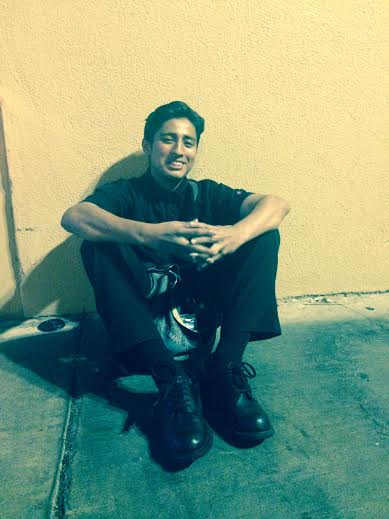The Low-Wage Worker Who Doesn't Want a Raise

Five times a week, David De La Cruz gets on the Metro bus in West Hollywood and heads to his minimum-wage job as a cashier at a Taco Bell downtown. The 30-minute ride gives him time to read for school or listen to music, but there’s one major drawback.
“It stinks. Like, the bus literally stinks,” says De La Cruz.
But seeing as he can’t afford any other way to get around town – no car, no motorcycle, no bike, no Uber – the 19-year-old has come to accept the smell.
Yet, De La Cruz remains opposed to raising the minimum wage, even though it would help him out.
SEE ALSO: A Few Dollars, A Big Difference
De La Cruz works 30-40 hours each week for the lowest legal wage in California: $9 an hour. The recent increase in Metro fares from $1.50 to $1.75 (from $75 to $100 for monthly passes) might not seem excessive, but when you’re on a tight budget like De La Cruz, every quarter counts.
Even still, De La Cruz is worried about the effort to raise his pay by as much as 40 percent. “I’m not an economist or anything, but I really don’t think it’s a great move,” he says. “For me, it might help, but I think it would hurt just as many – or more –people than it helps.”
De La Cruz knows that the customers at Taco Bell depend on the low prices, as many of them pay with their electronic benefit, or EBT, cards, using state or federal assistance. If Taco Bell had to pay its workers more, De La Cruz believes that the prices would increase and the customers would suffer.
“And they would probably cut our hours, too,” said his co-worker Jessica as she walked by.
SEE ALSO: May Day March Pushes For Workers' Rights, Fair Wages For L.A.'s Undocumented
Alhough De La Cruz is on one of the lower rungs of the economic ladder, he shares the fears of many big business who argue that the wage increase simply isn’t feasible. Such skepticism confounds many of the politicians, such as Los Angeles Mayor Eric Garcetti, who insist that the move is done precisely for their benefit.
There is no question that De La Cruz could use the extra cash; he pulls in about $1,000 each month after taxes. Most of it goes towards the basics: $500 for rent and approximately $65 for transportation. The remaining money goes toward food and other essentials, like schoolbooks, which cost him more than $250 this month.
De La Cruz’s single mom brought their family to Los Angeles from Mexico when he was four. Even with his mother working several low-paying jobs to keep their heads above water, De La Cruz is certain it was the best move for the family.
“Everyone says it all the time, but it really is the Land of Opportunity,” he says of the United States.
De La Cruz is majoring in English at Cal State University, Northridge, and hopes to become a language arts teacher after he graduates. The Dream scholarship, an award given to children of undocumented immigrants who have been in the United States since their formative years, helps assuage De La Cruz’s financial burden somewhat, but he still has to clock his hours each week at Taco Bell to make ends meet.
SEE ALSO: Undocumented Students Face Uphill Battle For Education Equality
There are multiple initiatives currently in motion that aim to help people like De La Cruz. While Mayor Eric Garcetti’s proposal to raise minimum wage to $13.25 over the next three years has gained the most traction, others feel that still more needs to be done. The Los Angeles Workers Assembly, a grassroots organization of activists, is campaigning for a citywide ballot measure that would raise minimum wage to $15 by 2017. "The $15 wage demand did not come out of thin air," wrote the group in a recent statement, “it is actually the minimum necessary for basic human needs in human dollars.”
But De La Cruz is worried that a wage hike might lead to higher prices at Taco Bell, and that would drive customers away. For him, fear of potentially losing his job outweighs the benefits of a potential increase in his hourly wage.
Critics of Garcetti’s plan have similar concerns. The Los Angeles Chamber of Commerce said last Tuesday an increase in minimum wage would "reduce, not increase the number of jobs” in the city. Others claim that if the mayor is successful it would push businesses out of Los Angeles and into neighboring cities.
SEE ALSO: South L.A.'s Low-Wage Workers: The Fast Food Worker
Still, the reality is that for more than half of the fast food workers in America, the pay isn’t enough to get by. A joint study from UC Berkeley and the University of Illinois last year showed that 52 percent of fast food workers were on government assistance, compared to 25 percent for the workforce as a whole.
“I could definitely use the extra couple bucks an hour just to help with rent and gas,” said Walter, cashier at a local Jack in the Box who chose not to give his last name. “I hope [the increase in minimum wage] happens.”
Those in favor of the increase believe it is necessary to assist in paying for everyday items, because as gas, rent and groceries continue to rise, wages have remained static for several years.
Despite his opposition to the mayor’s plan, even De La Cruz had to admit he could see a benefit to an increased minimum wage. “It’d help me pay for all these bus rides,” said De La Cruz.
This story is part of a minimum wage series produced by USC Annenberg students.
Contact Contributor Sean Burch here.



